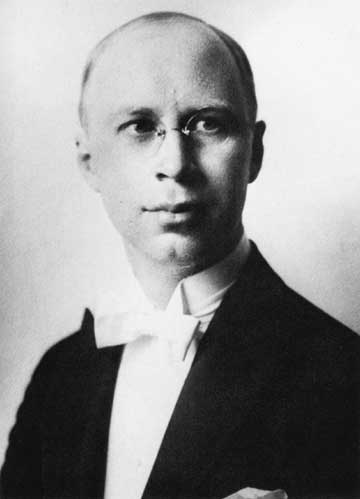|
||
|
Sergei Sergeyevich Prokofiev was born in Sontsovka in Ukraine on the 27th April 27 1891. As a child he showed exceptional musical abilities, composing his first piano piece at the age of five and his first opera at the age of nine. In 1904 he moved to St Petersburg where he was admitted to the conservatory at the particularly young age of 13. His teachers, who included Rimsky-Korsakov, however found him eccentric and arrogant, and he in turn described his education as boring and unsatisfactory. He began to develop a reputation as the enfant terrible of the music world developing an anti-romantic compositional style based on the use of disjointed melodies, dissonant harmony and sudden dramatic key shifts. His works however always adopted a popular idiom and his reputation as a composer began to grow. His conflict with the authorities came to a head over his entry, in 1914, for the coveted Rubenstein prize for piano. The rules of the competition required all contestants to play a classical concerto. Prokofiev insisted on playing his own piano concerto. The directors of the conservatory at first refused his entry, and then only agreed on the condition that he would provide each member of the jury with a copy of his score. Contrary to their expectations, Prokofiev managed to get the score printed in time. The performance was a great success with the audience, and the jury grudgingly awarded him the prize, but the chairman, Alexander Glazunov at first refused to make the presentation. After the revolution Prokofiev began a long period of self imposed exile from Russia, at first in the USA and later in Paris. In 1923, he married the Spanish singer Lina Llubera, a marriage which was not destined to last. As time drew on Prokofiev started to long for Russia again and he organised more and more of his premières and commissions to be in his home country instead of Paris. In 1934, he finally moved back to the Soviet Union permanently, at a time when the official Soviet policy sought to control and regulate musical composition. In 1935 the state denounced Shostakovich’s fourth symphony as formalistic and elitist, and it was against this background that Peter and the Wolf was composed. Peter and the Wolf has introduced generations of children to the orchestral instruments and equally enchants the adult audience. It is a sensitive glimpse into a child’s fantasy world, with wonderful characterisation of the protagonists through simple musical ideas, and imaginative childhood touches in the story such as the duck quacking inside the wolf at the conclusion. It takes its musical structure from the story, continuously developing and varying the motifs describing the characters. Prokofiev died at the age of 61 on 5 March 1953 on the
same day as
Joseph Stalin. He had lived near Red Square, and for three days the
crowds gathering to mourn Stalin made it impossible to remove his body
for a funeral service. When the funeral did occur it was accompanied by
paper flowers and a tape recording of the funeral march from his ballet
Romeo and Juliet. All the real flowers in the city were reserved for
Stalin's funeral as were the services of the musicians. He was finally
buried in the Novodevichy Cemetery in Moscow. Peter and the Wolf was performed by the Portobello Orchestra on the 14th July 2007. The narrator was Mitch Benn and the conductor was Anthony Weeden. back |

